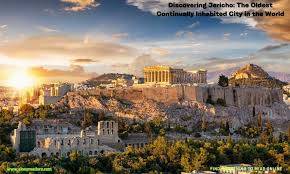With More Than 11,000 Years of History, Jericho is the Oldest Inhabited City in the World
Nestled in the Jordan Valley, near the Dead Sea and surrounded by the rugged hills of Palestine, Jericho holds the distinction of being the oldest continuously inhabited city in the world. With a history stretching back over 11,000 years, Jericho is a living testament to the resilience of human civilization, a place where ancient cultures, empires, and religions have left their mark over millennia.
The Birth of Civilization
Jericho’s story begins around 9,000 BCE, making it one of the first urban centers in human history. Archaeological evidence indicates that early settlers constructed permanent homes in the area, marking a pivotal shift from the nomadic lifestyles of hunter-gatherers to the beginnings of settled agricultural communities. This transition laid the foundation for the growth of cities and the rise of advanced societies in the Near East.
The most famous site in Jericho is *Tell es-Sultan*, an ancient mound that has revealed evidence of a thriving settlement dating back to the Epipaleolithic and early Neolithic periods. Excavations have uncovered remnants of ancient walls, including what is considered the world’s oldest known stone structure: a massive stone wall and a tower, both estimated to be around 8,000 years old. These structures suggest that Jericho was not only an important settlement for its time but also a center for trade, defense, and cultural exchange.
Jericho's Biblical Significance
Jericho's history is deeply intertwined with religious traditions, particularly in Judaism, Christianity, and Islam. The city is famously mentioned in the Bible, where the Israelites, led by Joshua, are said to have conquered Jericho after the walls miraculously fell when they circled the city. This event, often referred to as the Battle of Jericho, is one of the most well-known stories in the Hebrew Bible and the Christian Old Testament.
In Christian tradition, Jericho is also associated with the ministry of Jesus. The New Testament recounts how Jesus healed a blind man near the city and met Zacchaeus, the tax collector, in the town. These biblical connections have made Jericho a significant pilgrimage site for Christians from around the world.
Archaeological Discoveries
Jericho’s rich history has made it a focal point for archaeologists for many years. Excavations in *Tell es-Sultan* have uncovered a treasure trove of artifacts, including pottery, tools, and figurines, which provide insight into the lives of its early inhabitants. Additionally, the ancient city’s extensive fortifications, including the stone wall and the towering structures, suggest that Jericho was a major hub of trade and commerce, with access to vital resources such as water from nearby springs and fertile agricultural land.
The discovery of ancient graves and burials has further enriched our understanding of the people who lived in Jericho. Some of the earliest known human remains from the Neolithic period have been found here, offering a glimpse into the spiritual and social practices of the ancient inhabitants.
Modern Jericho: A Living History
Today, Jericho is a bustling Palestinian city with a population of around 20,000 people. It remains a symbol of historical continuity, where ancient ruins coexist with modern life. Despite its small size, Jericho’s economy thrives on agriculture, tourism, and its status as a strategic location near the Jordan River and the Dead Sea. The fertile land surrounding the city is ideal for growing dates, olives, and citrus fruits, which remain important agricultural products.
In addition to its historical and cultural significance, Jericho’s proximity to the West Bank and its role in the Israeli-Palestinian conflict have made it a focal point for political tensions. The city is currently administered by the Palestinian Authority, though it remains in close proximity to Israeli-controlled territories.
A Cultural Heritage
Jericho’s status as the oldest inhabited city is not just about its age, but its continuing role as a bridge between past and present. Visitors to Jericho can explore the ruins of ancient Jericho, visit the iconic *Mount of Temptation* where Jesus is said to have fasted for 40 days, or relax by the tranquil waters of the nearby Dead Sea. Jericho’s historical layers—dating from the Neolithic period through its time as a biblical city, all the way to its modern-day status—reflect the deep cultural and religious significance of the region.
As the oldest continuously inhabited city in the world, Jericho serves as a living monument to human ingenuity, resilience, and the complex interplay of history, religion, and culture. From its ancient walls to its bustling streets today, Jericho remains a symbol of humanity’s enduring quest to create, sustain, and shape civilization over the course of thousands of years.


